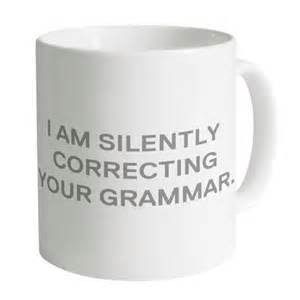Last year I discovered the perfect gift for the supercilious arse in your life: a mug emblazoned with the legend ‘I am silently correcting your grammar’.  The existence of this item testifies to the widely-held belief that sneering at other people’s language-use is not just acceptable, it’s actually a virtue. When the subject is language, you can take pride in being a snob; you can even display your exquisite sensitivity by comparing yourself to a genocidal fascist (‘I’m a bit of a grammar Nazi: I can’t bear it when people use language incorrectly’).
The existence of this item testifies to the widely-held belief that sneering at other people’s language-use is not just acceptable, it’s actually a virtue. When the subject is language, you can take pride in being a snob; you can even display your exquisite sensitivity by comparing yourself to a genocidal fascist (‘I’m a bit of a grammar Nazi: I can’t bear it when people use language incorrectly’).
On Twitter there’s a ‘Grammar Police’ bot whose mission is to belittle random strangers by tweeting unsolicited corrections of their ‘defective grammar’. Because, according to its profile, ‘publishing defective grammar abases oneself’.
‘Abases *oneself*’? Try ‘one’, or better, ‘you’. And maybe get your thesaurus out, because I don’t think ‘abase’ is the word you want.
What I’ve just done is an example of what I’m going to take issue with in this post: criticising the way someone has (mis)used language as a proxy for challenging their actual message. This strategy has featured prominently in critical commentary on Donald Trump: he’s been lambasted as often for his limited vocabulary, fractured syntax and inability to spell ‘hereby’ as he has for his bigotry, dishonesty and megalomania. Linguistically speaking, a lot of this commentary is wide of the mark (for a more illuminating take on Trump’s speech-style, try this). But the strategy was common long before Trump came on the scene. One of the first things I noticed when I joined Twitter in 2014 was how often liberal progressive types used the grammar-sneer to call out bigots. Like this*:
We should round all you feminazi’s up and put you on an island away from society.
we’ll be moving on to punctuation later this afternoon.
And this:
As a straight male how would u feel about yr child having a homosexual school teacher?! Who their around for 8hrs of the day?
If a gay teacher teaches my child the difference between they’re, their and there, I’m good.
The conflict that accompanied last year’s EU referendum produced a bumper crop of examples like this:
Britain was once a proud nation, but is now afraid to speak it’s own name.
and restore our ancient birthright of putting apostrophes where they don’t belong!
In the wake of the referendum, which the Leave side won, there was an upsurge of public racism and xenophobia—threats, vandalism, harassment, verbal abuse and violence targeting people perceived as ‘foreign’. Facebook pages were set up where people could report incidents they’d experienced or observed. A number of these reports followed the same formula: first they described a racist white Briton telling a non-white or non-British person to ‘start packing’ or ‘go home’, and then they commented that the racist couldn’t even speak English properly. One writer reported that she’d stood up to a white woman who harangued her in a shop, by telling her, among other things, that ‘I speak better English than you’. She explained that she’d heard the white woman speaking to someone else, and noticed that ‘her grammar was appalling’.
I’m not going to blame someone in this situation for defending herself with whatever weapons are to hand. My question is why claiming to speak better English than your adversary is so often a weapon people reach for. Why does it seem more apt, and less crass, than (for instance) ‘I’m better looking than you’ or ‘I’ve got more money than you’? Maybe it’s because it chimes with the idea that bigots are ignorant and stupid. It allows their critics to feel intellectually and culturally as well as morally superior (‘I’d hate my child to be educated by a gay teacher’. ‘Pity no one bothered educating you. Gotcha’). But however satisfying that may be, it raises the question of whether you can claim the moral high ground by using one unjust prejudice against another.
If you describe someone you’ve heard speaking in a shop as using ‘appalling’ grammar, the only thing you can mean is that s/he speaks a nonstandard dialect. In Britain, speaking a nonstandard dialect generally means that (a) you grew up working class and (b) you didn’t spend enough quality time in formal education for your native dialect to be replaced in everyday speech by the more prestigious dialect of the middle class (though you’ll use that dialect when you write, and you’ll certainly be able to read it). So, criticising a racist’s nonstandard grammar is mobilising one form of privilege (based on class and/or education) to attack another (based on whiteness). As I said before, I’m not going to blame the person who uses this tactic in self-defence. But that doesn’t mean I have to applaud the tactic.
Maybe you’re thinking: ‘but what you linguists call “nonstandard” is actually just bad English. Criticising that isn’t snobbery: anyone who goes to school for long enough to learn to read and write can learn what the correct forms are. If they haven’t learnt, it means they’re lazy. Plenty of working class people speak correctly: it’s an insult to suggest that bad grammar is good enough for them’.
Sorry, but no. Nonstandard English is not ‘bad’ by any objective criterion; it’s stigmatised because the people who use it have lower social status than the people who don’t. The actual linguistic forms used by nonstandard speakers (like, say, ‘we was’ instead of ‘we were’ or ‘she done it’ rather than ‘she did it’) are neither better nor worse than the forms we judge ‘correct’. The judgment is based on what class of person uses a particular form, and the form’s status can change as its class associations do. A hundred years ago, for instance, saying ‘aint’ was associated with upper-class Brits like Winston Churchill and the fictional Lord Peter Wimsey. Today it’s strictly for the lower orders, and it’s also become one of the most stigmatised of all English grammatical forms.
 As for the apostrophe fetish (‘its’ and ‘it’s’, or ‘they’re’ versus ‘their’), that’s got nothing to do with grammar. The English apostrophe does mark grammatical distinctions, but the reason people make mistakes isn’t that they don’t know the difference between possessive pronouns and contracted verb forms: what they don’t know is which spelling goes with which form. The possessive form of nouns has an apostrophe (as in ‘the dog’s bowl’), so people often reason that the possessive pronoun ‘its’ should logically have one too. It’s also easy to pick the wrong option when writing in haste or on autopilot. On this one I’m with Jesus: ‘let anyone who is without sin cast the first stone’.
As for the apostrophe fetish (‘its’ and ‘it’s’, or ‘they’re’ versus ‘their’), that’s got nothing to do with grammar. The English apostrophe does mark grammatical distinctions, but the reason people make mistakes isn’t that they don’t know the difference between possessive pronouns and contracted verb forms: what they don’t know is which spelling goes with which form. The possessive form of nouns has an apostrophe (as in ‘the dog’s bowl’), so people often reason that the possessive pronoun ‘its’ should logically have one too. It’s also easy to pick the wrong option when writing in haste or on autopilot. On this one I’m with Jesus: ‘let anyone who is without sin cast the first stone’.
But there are other reasons for feminists (and other defenders of equality and social justice) to think twice before mocking a political opponent’s ‘incorrect’ use of language. Here are a few of them.
1. It’s a red herring
Earlier I mocked the creator of the Grammar Police bot for using ‘oneself’ incorrectly. It was a fine display of my superior linguistic knowledge, but it also completely missed the point. My quarrel with the bot-maker isn’t that he corrects other people’s grammar when his own is nothing to shout about. It’s that correcting strangers’ grammar in public is a shitty thing to do.
The same problem arises with the political examples I took from Twitter. In no case does the response engage directly with the tweeter’s prejudice. It says, in effect, ‘this mistake tells me you’re stupid, and if you’re stupid I can just dismiss your argument, which is also, by extension, stupid’. And the argument may indeed be stupid, but it wouldn’t be any less stupid if it were spelled correctly (just as Hitler wasn’t any less fascist because he could write a coherent sentence). Conversely, deviations from standard usage do not make a true fact less true or a just argument less just. The moral status of what someone says is about the content, not the grammar.
2. It cuts more than one way
On this blog I have complained frequently about the policing of women’s language, arguing that there’s no linguistic justification for the criticisms people make of uptalk and vocal fry, hedging, apologising, etc. What’s behind this is common or garden sexism: if a way of speaking is associated (accurately or otherwise) with women, it’s judged inferior to the male alternative. Not because it objectively is inferior, but just because women are the lower status group.
Judgments on nonstandard language work in exactly the same way, the difference being that the relevant status hierarchy is based on class and education rather than gender. So, when feminists engage in grammar policing they’re undermining their own objection to the gendered equivalent. If you dismiss someone’s argument because of a misplaced apostrophe, what do you say to the people who claim they can’t take women seriously because of their ‘shrill’ voices and annoying ‘verbal tics’?
3. It’s a vote for the status quo
People sometimes say: ‘OK, I get that what’s “correct” is arbitrary, but if you want to get your point across you have to play by the rules’. But this is not a progressive argument, because it treats ‘the rules’ as neutral rather than asking whose interests they serve. If someone defends a workplace dress-code requiring women to wear high heels as just ‘reflecting the prevailing standard for appropriate female business attire’, we don’t say, ‘oh, OK then’, we say it’s time the standard was changed.
In the case of linguistic standards, we should question why we’re so obsessed with shibboleths like ‘aint’ and ‘we was’ and the apostrophe, which say a lot about a person’s social background and education, but very little about how well they can actually communicate. Would any feminist suggest that the nonstandard grammar of the phrase attributed to Sojourner Truth, ‘and aint I a woman?’ detracts from the clarity, coherence or persuasiveness of her speech?
4. In other contexts you’d call it ‘shaming’
If you don’t think it’s acceptable to make people feel ashamed (or exploit the fact that they already feel ashamed) of their bodies, their clothes, what they eat or who they have sex with, you’re going to have to explain to me why shaming them for the way they speak or write is different.
5. Modesty becomes you
If your own grammar and spelling are 100% standard, that’s probably because you served a long apprenticeship in a series of educational institutions where, through constant practice and feedback, you acquired a set of socially-valued linguistic skills which eventually became ingrained habits. Well, good for you, but let’s not get carried away. Other people have gone through a similar process to master a craft like carpentry or hairdressing. They also take pride in their skills, but they don’t mistake them for proof of superior intelligence. They don’t come to your house and laugh at the wonky shelf you made, or stop you on the street to offer unsolicited advice on blow-drying. If they did, how would you react? Which brings me to…
6. It’s counterproductive
This point is well made in a post Nic Subtirelu wrote in 2015 after Grammarly (a major player in the online culture of language pedantry) drew attention to the poor grammar and spelling it had found on Facebook pages for supporters of Donald Trump.  What are the angry white working class men who came out in force for Trump in 2016 going to think about liberals making fun of him because he doesn’t use big words or complicated sentence structure? Might that not reinforce their conviction that supporting Trump is striking a blow against ‘the elite’, aka snobs who look down on anyone less educated than themselves?
What are the angry white working class men who came out in force for Trump in 2016 going to think about liberals making fun of him because he doesn’t use big words or complicated sentence structure? Might that not reinforce their conviction that supporting Trump is striking a blow against ‘the elite’, aka snobs who look down on anyone less educated than themselves?
Maybe your answer is that you don’t care what a bunch of racists, misogynists and homophobes think. Fine, I’m not asking you to (though I do think a commitment to social justice requires you to care about the economic inequality which is clearly a factor in the rise of right-wing populism). By all means take issue with bigots–but for their politics, not their punctuation. Criticise their views, not the size of their vocabulary. Stop using their grammar as a measure of their moral worth.
Language pedantry is snobbery and snobbery is prejudice. And that, IMHO, is nothing to be proud of.
*The examples used in this post are real, but I’m not supplying links, names, handles or screenshots because I’m not trying to single these particular authors out, I’m just illustrating something that’s very common.

[…] Source: Pride, prejudice and pedantry […]
LikeLike
[…] “By all means take issue with bigots–but for their politics, not their punctuation. Criticis… […]
LikeLike
[…] should we really care about which grammatical marks Trump does or does not use? As my fellow linguist Deborah Cameron writes, “[Trump has] been lambasted as often for his limited vocabulary, fractured syntax and […]
LikeLike
[…] of their language is always a cowardly attack. Linguist Deborah Cameron makes the point that this is still the case even when highlighting the poor linguistic skills of bigots and racists on social media. Tempting […]
LikeLike
[…] of their language is always a cowardly attack. Linguist Deborah Cameron makes the point that this is still the case even when highlighting the poor linguistic skills of bigots and racists on social media. Tempting […]
LikeLike
[…] of their language is always a cowardly attack. Linguist Deborah Cameron makes the point that this is still the case even when highlighting the poor linguistic skills of bigots and racists on social media. Tempting […]
LikeLike
[…] of their language is always a cowardly attack. Linguist Deborah Cameron makes the point that this is still the case even when highlighting the poor linguistic skills of bigots and racists on social media. Tempting […]
LikeLike